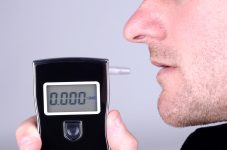The Treat That Can Make You Fail A Breath Test!

Cherry Ripes, tooth-pastes, Strepsils, mouthwashes, cough medicines and antibiotics have all been blamed for causing drivers to fail breath tests. But can these seemingly innocuous substances ever really be the culprit?
It is well-known that alcohol from some mouthwashes and cough medicines can temporarily be detected in your breath – but only for about fifteen minutes or so. After the mouth alcohol has dissipated, a positive reading should no longer register.
Cherry Ripes are tasty, and Strepsils are soothing, but neither have been shown to produce positive readings.
However, the same can’t necessarily be said about another treat that many of us enjoyed while growing up.
Bubble O’Bill: You Bad ‘Ole Thing
The claim may seem bizarre, but it has been reported that one Victorian man blamed the popular ice cream Bubble O’Bill for blowing a positive reading into his interlock device.
An interlock device is a mechanism that is fitted into a car driven by someone who is on the “alcohol interlock program”. Drivers are normally referred to the interlock program by a court after they have been convicted of a drink driving offence, and can start the program after they have served a period of time off the road; eg 12 months. They will need to keep the device fitted for a specific period of time; eg 48 months.
The Victorian Bubble O’Bill-eater applied in court to have his interlock device removed, but police opposed his application on the basis that he had blown one positive reading.
But the man stood firm – adamant that he did not drink alcohol before blowing the positive reading, and that he had only eaten a Bubble O’Bill.
The excuse may not have seemed likely, but the Magistrate decided to put it to the test.
The driver was told to go across the road to buy the ice cream, and to return without eating it.
He did so, and blew 0.00 when tested by police. He then ate the ice cream and ‘lo and behold’, he blew a reading of 0.018 – which would be enough to fail an interlock test.
The Magistrate then granted his application to have the device removed, satisfied that the treat really did giving him a positive reading.
What are the legal limits for driving?
For most drivers with a full licence, 0.05 is the legal limit. But for some drivers, such as bus or taxi drivers, the limit is 0.02.
For those on a provisional or learners licence, the prescribed alcohol concentration must be 0.00; and the same goes for those who have an interlock device fitted to their car.
Interlock devices detect any level of alcohol in your breath. If you return a positive reading, you will fail the test and the car will be disabled.
Compulsory Interlock Program
Since February, drivers convicted of high range drink driving and repeat drink drivers are required to have an interlock device fitted into their car.
Most interlock device companies recommend waiting 15 minutes after eating or drinking before driving.
For foods which happen to contain a very small amount of alcohol, this can stay in your mouth for several minutes after it is consumed.
While it is helpful to be aware of alcohol in products that you consume before driving, it is highly unlikely that small amounts of alcohol in a mouthwash or a treat will get you charged with drink driving.
What happens if I fail a roadside breath test?
In NSW, if you fail the original roadside breath test, reading, you will be taken back to a police station or ‘booze bus’ and subjected to a breath analysis.
It is likely that by this time, the small amount of alcohol in food or mouthwash will be gone, and you will therefore avoid being charged.
If you are facing drink driving charges, speak to an experienced, specialist traffic lawyer as soon as possible to find out your options – including whether you can beat the drink driving charge or, if you wish to plead guilty, avoid a criminal conviction and licence disqualification.






